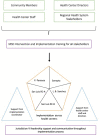Testing Scalability of a Diabetes Self-Management Intervention in Northern Mexico: An Ecological Approach
- PMID: 34490173
- PMCID: PMC8416481
- DOI: 10.3389/fpubh.2021.617468
Testing Scalability of a Diabetes Self-Management Intervention in Northern Mexico: An Ecological Approach
Abstract
Background: Type 2 diabetes mellitus (T2DM) has become a major issue in Mexico, reporting almost 100,000 attributable deaths in 2016. Low-income Mexican citizens who face various issues associated with T2DM, including the lack of access to self-management services, are particularly affected by the condition. Health centers have been designated to serve T2DM patients by providing resources on chronic disease prevention. Meta Salud Diabetes (MSD) is a self-management intervention developed to address cardiovascular complications and other health issues within the T2DM population, which have been proven effective and useful for health centers. The intervention was designed for T2DM support groups-grupos de ayuda mutua (GAMs) located within health centers. Methods: From February to June 2019, a binational research team conducted a test scale-up study in Northwest Sonora under the Ministry of Health utilizing the Institute for Healthcare Improvement Framework for scaling up health interventions. Investigators worked in collaboration and trained 19 stakeholders from a regional health system identified from various ecological levels on MSD and implementation process. Results: All five GAMs within the regional health system received and completed the intervention. In total, 72 participants were enrolled with behavioral and biological [HbA1c, blood pressure, body mass index (BMI)] measures taken at baseline. Post-intervention measurements were taken from 72% of participants who completed the intervention. Statistical analysis demonstrated improved behavioral and biological measures when comparing baseline to post-intervention, specifically statistically significant improvements in HbA1c and sugar-sweetened beverage consumption. Implementation fidelity (IF) measures indicated extensive adherence to the intervention curriculum, and moderators specifically demonstrated influences on implementation. Stakeholders from various ecological levels provided support to those facilitating the MSD intervention by allotting time and resources to properly prepare for sessions. An implementation coordinator from the regional health office assisted MSD facilitators by resolving barriers to implementation and worked toward federal accreditation for GAMs to receive additional funding. Conclusion: Results provide evidence for using regional health systems as a scalable unit when implementing chronic disease self-management interventions state- and nationwide. This study will help inform future efforts to scale up the health intervention in various states throughout Mexico. Clinical Trial Registration:www.ClinicalTrials.gov; https://www.clinicaltrials.gov/ct2/show/NCT02804698?term=NCT02804698&draw=2&rank=1, identifier: NCT02804698.
Keywords: chronic disease; diabetes; implementation; mexico; self-management.
Copyright © 2021 Aceves, Denman, Ingram, Torres, Nuño, Garcia, Madhivanan and Rosales.
Conflict of interest statement
The authors declare that the research was conducted in the absence of any commercial or financial relationships that could be construed as a potential conflict of interest.
Figures
References
-
- Secretaria de Salud. Emite la Secretaría de Salud emergencia Epidemiológica por Diabetes Mellitus y Obesidad. Secretaria de Salud de Mexico (2017). Available online at: https://www.gob.mx/salud/prensa/emite-la-secretaria-de-salud-emergencia-... (accessed June 2, 2019).
-
- Principales Causas de Mortalidad General. Sistema Nacional de Información en Salud. (2008) Available online at: http://sinais.salud.gob.mx/mortalidad/ (accessed February 1, 2018).
-
- GBD Results Tool GHDx . Global Health Data Exchange. Available online at: http://ghdx.healthdata.org/gbd-results-tool (accessed April 10, 2018).
-
- Instituto Nacional de Salud Publica Encuesta Nacional de Salud y Nutrición . Instituto Nacional de Salud Publica, Mexico: Secretaria de Salud de Mexico (2018).
Publication types
MeSH terms
Associated data
Grants and funding
LinkOut - more resources
Full Text Sources
Medical
Miscellaneous



